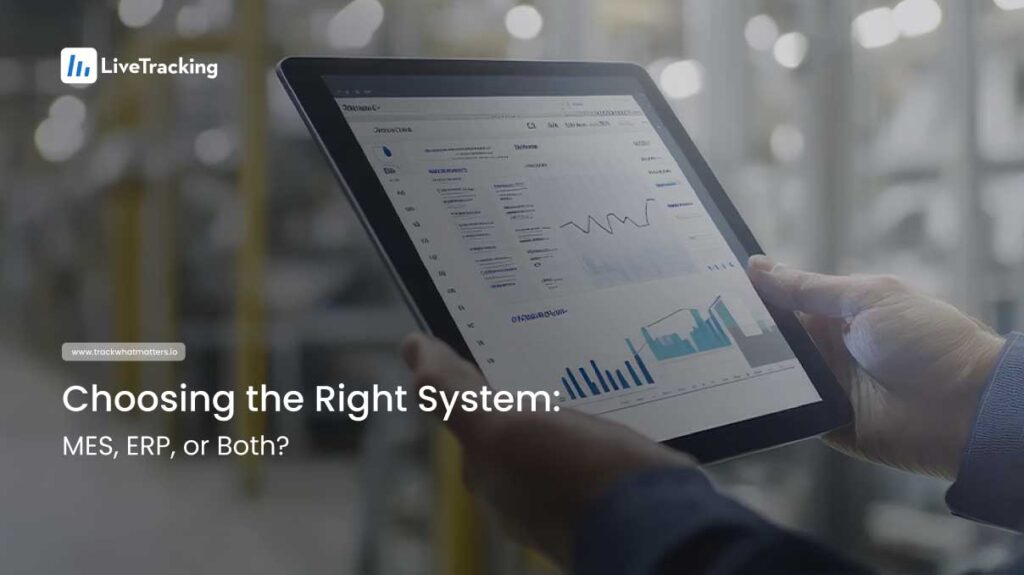Software project management software MES vs ERP: Understanding the Key Differences and Benefits
Understanding the differences between Manufacturing Execution Systems (MES) and Enterprise Resource Planning (ERP)

The text explores the critical decision-making process of selecting between MES (Manufacturing Execution System), ERP (Enterprise Resource Planning), or both, emphasizing how software project management software enhances operational efficiency. MES benefits manufacturers focused on production optimization, particularly in regulated industries like pharmaceuticals or automotive. ERP, meanwhile, supports cross-departmental management across finance, HR, and logistics. The combination of MES and ERP, when integrated with modern software project management software, empowers real-time analytics, streamlined workflows, and enhanced business decision-making. A robust cost-benefit analysis and attention to industry-specific needs are vital for successful implementation.
Deciding between MES, ERP, or a combination of both systems depends on the specific needs and goals of an organization. Companies focused primarily on manufacturing efficiency may benefit from implementing an MES to optimize production processes. This is particularly true for industries where real-time data and quality control are critical, such as pharmaceuticals, automotive, and electronics. An MES can provide detailed insights into production metrics, allowing manufacturers to quickly identify bottlenecks, reduce waste, and ensure compliance with industry regulations. By leveraging real-time monitoring and analytics, organizations can enhance their operational agility and responsiveness to market demands.
Conversely, organizations that require comprehensive management across multiple departments may find that an ERP system is more suitable. ERP systems are ideal for businesses looking to streamline operations, improve financial visibility, and enhance overall organizational performance. They integrate various functions such as finance, HR, supply chain, and customer relationship management into a single platform, which fosters better communication and collaboration among departments. This holistic view of the business enables decision-makers to make informed choices based on accurate data, ultimately driving strategic growth. In many cases, a hybrid approach that combines both MES and ERP can provide the best of both worlds, allowing for optimized manufacturing processes while maintaining robust business management capabilities. By synchronizing the two systems, organizations can ensure that production data feeds directly into financial and operational planning, creating a seamless flow of information that supports continuous improvement initiatives.
The cost of implementing MES and ERP systems can vary widely based on several factors, including the size of the organization, the complexity of the processes, and the specific features required. Generally, MES implementations tend to be less expensive than ERP systems due to their narrower focus. However, the total cost of ownership must also consider ongoing maintenance, training, and potential upgrades. For instance, organizations may need to invest in specialized hardware or software to support the MES, which can add to the initial costs. Additionally, the integration of MES with existing systems can require further investment in middleware or custom development, which should be factored into the overall budget.
ERP systems, while often more costly to implement, can lead to significant long-term savings by improving overall operational efficiency and reducing redundancy. It is essential for organizations to conduct a thorough cost-benefit analysis before making a decision. This analysis should include not only the initial investment but also the potential return on investment (ROI) based on improved productivity and reduced operational costs over time. Furthermore, organizations should consider the scalability of the systems; as businesses grow, the ability to adapt and expand the system without incurring excessive costs becomes crucial. This foresight can prevent future financial strain and ensure that the system remains aligned with the evolving needs of the organization.
Another critical aspect to consider is the potential impact on workforce dynamics. Implementing an MES or ERP system often necessitates a shift in how employees perform their tasks, which can lead to resistance or a learning curve. Organizations should allocate resources for training and change management to facilitate a smoother transition. Engaging employees early in the process can also foster a sense of ownership and reduce pushback. Moreover, the long-term benefits of improved data visibility and decision-making capabilities can significantly outweigh the initial costs, making it imperative for companies to view these systems not just as expenses, but as strategic investments in their future.
The choice between MES and ERP often depends on the specific industry and operational requirements. For instance, industries such as food and beverage, pharmaceuticals, and automotive manufacturing heavily rely on MES for real-time monitoring and compliance with strict regulatory standards. In these sectors, the ability to track production processes and ensure quality is paramount. MES systems facilitate the collection of data from the shop floor, allowing for immediate adjustments to be made in response to any deviations from the desired production parameters. This real-time capability not only enhances product quality but also minimizes waste and reduces the risk of costly recalls, which can be particularly damaging in highly regulated fields.
On the other hand, industries like retail, logistics, and service-oriented businesses may benefit more from ERP systems that provide a comprehensive view of operations across various departments. These organizations often require robust financial management, supply chain logistics, and customer relationship management capabilities, which are core functions of ERP systems. For example, a retail company can leverage ERP to integrate inventory management with sales data, enabling more accurate forecasting and efficient stock replenishment. Additionally, ERP systems can streamline communication between departments, ensuring that marketing, sales, and finance are all aligned in their strategies and objectives, which is critical for maintaining a competitive edge in fast-paced markets.
Ultimately, the decision to implement MES, ERP, or both should be guided by an organization’s specific operational needs, industry standards, and long-term strategic goals. By carefully evaluating these factors, businesses can select the system that best aligns with their objectives and enhances their overall efficiency. Furthermore, companies may also consider hybrid approaches that integrate both MES and ERP functionalities, allowing them to harness the strengths of each system. This integrated solution can provide a holistic view of operations, enabling businesses to respond swiftly to market changes and optimize their processes across the board. As technology continues to evolve, the interplay between MES and ERP will likely become even more critical, paving the way for smarter, more agile manufacturing and operational strategies.
Ready to unlock the full potential of your manufacturing or business operations? With LiveTracking, you can schedule a quick discovery call and experience firsthand how our solutions can streamline your processes. Take advantage of our free 30-day full demo and see how we specialize in boosting equipment efficiency by a remarkable 15%. Don’t miss the opportunity to simplify the tracking of critical statistics and enhance your operational efficiency. Schedule a quick Demo call today and let’s explore the opportunities within the next two weeks!

1. What is software project management software?
It’s a digital tool that helps plan, execute, and monitor projects across departments, including manufacturing, finance, and operations.
2. How does MES benefit manufacturing companies?
MES improves shop floor visibility, ensures quality control, and optimizes real-time production performance.
3. Why should a company use ERP instead of MES?
ERP supports a broader range of business functions like HR, finance, and supply chain, offering comprehensive business integration.
4. Can software project management software integrate with both MES and ERP?
Yes, it acts as a bridge between the two, providing unified dashboards, resource management, and analytics tools.
5. What industries benefit from a hybrid MES-ERP approach?
Industries with both high regulatory demands and complex supply chains—like pharmaceuticals and automotive—gain the most from hybrid systems.
Share
Table of Content
Stay Up-to-Date
Get LiveTracking news in your inbox.
Error: Contact form not found.
By submitting this form I have read and acknowledged the Privacy Policy.
The latest industry news, interviews, technologies, and resources.
Understanding the differences between Manufacturing Execution Systems (MES) and Enterprise Resource Planning (ERP)